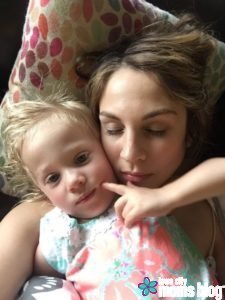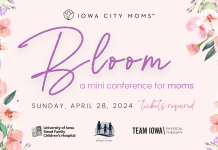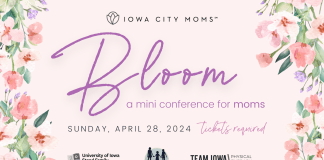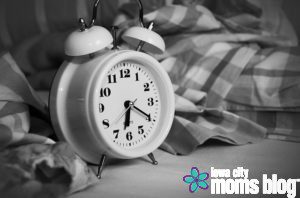 “Michele… Pssst… Hey, Michele…*nudge*… wake up…*nudge*…the baby is awake…Michele…”
“Michele… Pssst… Hey, Michele…*nudge*… wake up…*nudge*…the baby is awake…Michele…”
I find it hard to imagine that there are any moms unfamiliar with the extreme exhaustion that comes with having an infant. On the other hand, I assume that the majority of them wake up to the sound of their babies crying most nights. However, that has rarely been the case for me. Multiple times a night my husband would try to wake me up to nurse our daughters. Now that they are older and not relying on me for mid-night feedings, my husband usually gets up. It has been eight years since the birth of our oldest, and he still has to wake me up if they call for me during the night. It has also been eight years since I became fully aware of how my excessive sleepiness has impacted me life.
In kindergarten, I would ride the bus after school, falling asleep almost daily and missing my stop. In first grade, I vividly remember falling asleep on a field trip and waking up tired and confused after what I believed had been hours. It wasn’t until high school I realized the factory we visited was only about 15 minutes away.
Every night I would crawl into bed with my mom, often crying from nightmares, and every morning she had to battle my endless requests for “5 more minutes.” Unfortunately, the naps and rough mornings were nothing compared to the nightmares. I can still remember many of the nightmares from my childhood. They were as vivid as real life, and eventually they transitioned into lucid dreams. But I never grew out of them. They continued into adulthood. The only thing that changed is I woke up crying to my husband instead of crawling into my parents’ bed.
In high school, I rode with a friend to dance practice every morning before school and despite all effort to stay awake and keep her company at 5:30 a.m., I couldn’t. I fell asleep almost every morning. I struggled staying awake in the evenings to do homework or read.
In college, I would sit front and center of my class, excited and ready to learn. Within minutes of the lecture, my notes would turn to scribbles as my head would drop to the desk. In the evening, if I had enough energy to go out with friends, I would regularly find a spot to fall asleep.
Individually, none of these examples seemed problematic at the time, and it was easy to say, “I’m not a morning person,” “I like naps,” “I need more sleep”… except I slept plenty. In fact, I slept more than most people. But, the night my husband woke me up in a panic as I fell asleep nursing our daughter was a problem. She had slipped down next to me in the chair and I was completely unaware. Luckily, she was completely unharmed and I found new less comfortable positions to nurse. Finally, when I returned to work I struggled to stay awake during my morning commute, which was only 10-15 minutes.
We never hesitate to ask for advice and opinions about getting our children on a good sleep schedule, but as moms, we don’t often focus on our own sleep, which is essential to living a healthy and productive life.
After too many mornings of dozing off at a stoplight, I decided to call my physician. She was supportive and understanding, but I was shocked when she voiced her concern that I was possibly narcoleptic. She ended up referring me for a sleep study and I was ultimately diagnosed with idiopathic hypersomnia, characterized by excessive daytime sleepiness (EDS). Although by definition, idiopathic means “unknown cause”, I still felt a sense of relief knowing that I wasn’t just ‘lazy’. Better yet, I realized there were treatment options and I didn’t have to feel like this forever.
Aside from periods of pregnancy/breastfeeding, I’ve now had almost eight years of being able to manage my hypersomnia. However, having the ability to stay awake more makes me susceptible to overdoing it. I have to be extra cautious about how much I push myself at night or my body will eventually crash. I know that it doesn’t matter how early or late I go to bed, I will still struggle to wake up in the morning. I set almost an hour of alarms daily (at completely random increments) to get up.
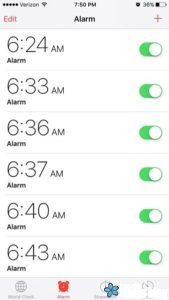
But, I’ve learned to accept that is just part of my life. Instead, I focus on the fact that I am now able to have a treatment plan that allows me to be alert and productive during the day. Better yet, the nightmares that have been a regular part of my life from early childhood through adulthood have become almost nonexistent the last eight years. (Although I have no idea scientifically what the relationship is between my nightmares and hypersomnia, there has been an undeniable improvement.)
I spent years not really talking about my struggles with sleep, primarily because I thought I would be judged as lazy or my parenting ability would be questioned. Now that I discuss it more openly, I still tend to do it in a joking manner to minimize it. However, May is Better Sleep Month and I think sleep is an important topic, specifically for moms, to discuss. We never hesitate to ask for advice and opinions about getting our children on a good sleep schedule, but as moms, we don’t often focus on our own sleep, which is essential to living a healthy and productive life. We view naps as vital to our young children’s routine, yet feel the need to justify taking the time to nap as adults. Taking time to recharge is not selfish. Taking care of ourselves is essential. For me, that means making sure my body gets the amount of sleep it needs to allow me to be the mom my children deserve.
